This week on Myths and Legends, it’s the origin story of Merlin,a botched antichrist who uses his evil magical powers for good. Vortigern’s horrible, horrible decision making catches up to him in the worst way possible, and you’ll see how to catch some dragons – just get them really, really drunk and they’ll go to sleep. Then, in the creature of the week, if you meet this creature in the forest, it’ll give you seizures and maybe eat you. The good news is that if you know its name, you can scare it off. The bad news is, as you’ll hear me struggle later, its real name is nearly impossible to pronounce.
What's Red, White and Fighting All Over
This is Myths and Legends, Episode 6B: What’s Red, White, and Fighting all over
This is a show where I tell the stories that have shaped cultures throughout history. Some are incredibly popular stories you think you know, but with surprising origins. Others are stories you probably haven’t heard, but really should.
Previously
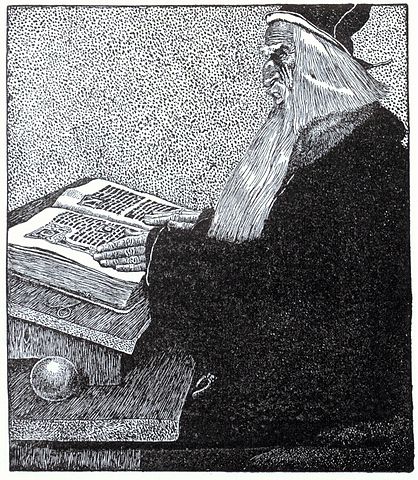 Previously on the show, I started at the very beginning of the Arthurian legends, with king Vortigern seizing the throne through treachery and the princes Aurelius Ambrosius and Uther Pendragon, Arthur’s future father, choosing exile to the continent over death. His subjects hate him, so he settles the Germanic Saxons on the island to protect him from internal threats as well as his own people. They turn on him, and he’s exiled to the Welsh highlands, where he’s trying to build a fortress, but it keeps collapsing. Informed by his magician advisors that the mortar needs to be mixed with the blood of a boy without a father, his men find such a boy in a nearby town. That child is named Merlin, the future legendary wizard.
Previously on the show, I started at the very beginning of the Arthurian legends, with king Vortigern seizing the throne through treachery and the princes Aurelius Ambrosius and Uther Pendragon, Arthur’s future father, choosing exile to the continent over death. His subjects hate him, so he settles the Germanic Saxons on the island to protect him from internal threats as well as his own people. They turn on him, and he’s exiled to the Welsh highlands, where he’s trying to build a fortress, but it keeps collapsing. Informed by his magician advisors that the mortar needs to be mixed with the blood of a boy without a father, his men find such a boy in a nearby town. That child is named Merlin, the future legendary wizard.
Merlin, Myrddin, or...Aurelius?
We are going to sidestep the main narrative a bit today to fill in the background for this incredibly important character.
Merlin is an interesting figure. He's the prototypical wizard, and he has an intelligence modifier so high that he always seems about three steps ahead of both his enemies and his friends. He's enigmatic and contradictory – a prophet and a demon, a baptized antichrist, a wild man and the advisor to kings.
There are two main backstories for the wizard. The first is a combination of a Brittonic bard that went mad and gained the power of prophecy and a Romano-British general. The second is the advisor to King Arthur that is a near complete fabrication of Geoffrey of Monmouth after reading and interpreting the stories about the first two people.
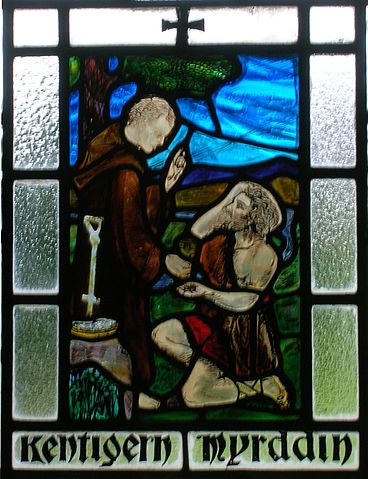 Myrddin, the man Merlin is partially based off, was a bard in what is now either south-west Scotland or northwest England, and he served one of those petty kings I talked about in the last episode. I’m not going to say too much about him today, because he’s going to have his own little episode in a couple of weeks, where I’ll tell his story. Generally, though, he was a Welsh warrior bard whose king lost a war. Seeing his friends dead on the battle field, he snapped and went insane, running off into the forest and living there for some time. In his madness, he’s given the ability from God to prophesize, following a common trope in medieval literature, and he lives at piece with the animals. He runs into problems, though, reconciling his peaceful life in the forest with that of the city, with his family, where’s he’s continually reminded about what he saw on the battlefield.
Myrddin, the man Merlin is partially based off, was a bard in what is now either south-west Scotland or northwest England, and he served one of those petty kings I talked about in the last episode. I’m not going to say too much about him today, because he’s going to have his own little episode in a couple of weeks, where I’ll tell his story. Generally, though, he was a Welsh warrior bard whose king lost a war. Seeing his friends dead on the battle field, he snapped and went insane, running off into the forest and living there for some time. In his madness, he’s given the ability from God to prophesize, following a common trope in medieval literature, and he lives at piece with the animals. He runs into problems, though, reconciling his peaceful life in the forest with that of the city, with his family, where’s he’s continually reminded about what he saw on the battlefield.
As for the Romano-British warrior, Merlin is based on him literally in name only. In earlier histories, the boy Aurelius Ambrosius goes to Vortigern, so Geoffrey of Monmouth swaps that boy out for this young prophet and calls him Merlin Ambrosius, no relation to the brother of Uther Pendragon, Aurelius Ambrosius, who is the character who’s actually based on the boy sent to Vortigern. I told you all this was a tangled mess.
Sympathy for the Devil
Regardless, Geoffrey of Monmouth’s version of Merlin is the most widely-accepted and the best place for us to start. We’ll start with his mother.
Adhan had a hard life, for the daughter of a king. Her mother, it was said, had communed with demons, and gone mad. She strangled Adhan's brother, and then killed herself. Her father, the king of Dimetia, had fallen into a deep sorrow after losing his son and wife, and died as well of a broken heart of grief or something, because I guess the plot demands that he be dead and death by a broken heart, though completely ridiculous, this trope is a common goto for much of literature. His advisors began jockeying for power, and the one that took over the kingdom quietly pushed Adhan and her two sisters aside. One of her sisters had been accused of adultery and put to death…because middle ages. The other married into a common family and faded into obscurity. Only Adhan remained in the castle.
Hope you guess my name
She was terribly lonely, and began talking to herself and the empty corridors. To her surprise, the darkness began to respond. It was the voice of a young man, and though he never let her see her, he seemed quite kind. She thought that she was going crazy, at first, but soon she didn't care. She loved spending time with him, and having someone to talk to.
They talked and talked, and the world seemed to feel a bit brighter. Time went on, and when she closed her eyes, she could touch him, though if she opened them she would see nothing. He was warm, and caring, and she was glad to have him for company. She couldn't tell anyone, of course. Her family had been supposedly cursed, and accused of consorting with demons. If she told anyone about him, at best they would think she was crazy, and at worst that she was going the way of her mother. They would think he was a demon.
The kind young man begins to visit her in the night, and at first it's just to talk and stuff, but one night he kisses her. Cut to candles flickering and the curtains blowing in the wind.
Weeks later, she finds that she's pregnant. Horrified, she talks to the darkness, who responds, this time with an icy tone. Finally, he says, he was getting tired of listening to her grating voice and about her sad little life. She doesn't understand, but he informs her that she will be giving birth to the Antichrist. Yes, he absolutely was a demon. This story starts out with a demon conference where they decided that Jesus has really mucked things up for them, so they're going to try that same move, and impregnate a virgin to give birth to the antichrist. For some reason they sit on this plan for 500-something years after the birth of Christ until this third daughter of a minor king in scotland is born.
She is shaking and weeping and runs to the local priest, who says that, oh wow, of course, a spirit got you pregnant. It's not like he doesn't hear that once a week, but could see she was shaken and insistent. Demon pregnancy or not, it's obvious that this woman was in bad emotional and psychological state, and needed help. He hides the woman in the church, and she stays in the high tower so that no one save a few of the more discreet nuns knows that she's up there, medieval responses to women having children outside of wedlock being what they were.
Months pass, and it's the night of the child's birth. Adhan struggles, and finally he is born. Instead of crying, though, she hears snarling. She looks down and sees a grotesque humanoid, lashing out at the nuns. They hold the baby down, and father Blaise rushes in with baptismal waters, and quickly baptises the thing.
It responds with shrieks and screams at first, but quickly calms down. They swaddle the thing, and it sleeps that night in Adhan's arms. The next morning, when she looks down, she sees a normal human-looking baby, the baptism having completely expelled the demon half of him. She thanks the priest, and names the baby Merlin.
So, it seems like the demons didn’t really think things through. Yes, they deceived a woman and got her pregnant, but then tell this deeply-religious woman that she will be giving birth to the spawn of the devil, and there’s nothing she can do about it. Except baptizing him, which will scuttle this plan and turn him completely normal. Yes, baptizing, that thing they do to literally every baby born to even nominally Christian parents in the middle ages. Then they just kind of give up. Like I said, they really didn’t think this through.
Nuns and palace intrigue, a potent mix
Years pass, and it's obvious that this Merlin is no normal child, his supernatural parentage having had an effect on him. He finds he has no small skill with magic, and he can make alarmingly accurate prophecies. He's like characters Blade or Hellboy, he was born with evil power, but he uses it for good. Mostly. Like anything having to do with these legends, it's all about which sources you read.
The priest uses his clout in the community so that Adhan and Merlin are not put to death, but she is still greatly shamed. The king agrees to let her live in the church, and she takes the vows of a nun. Merlin is cared for by the order and the priest could see something special in him, and begins a book of the young man's prophecies. Years pass, and even though Adhan is perhaps as non-threatening as a person can be, the political intrigue follows her. Her son, though illegitimate, is the son of a princess and the grandson of the last king. If there was going to be someone to rally forces against the current petty king, they would get being Merlin. The priest could see what was going on, and, in the night, sent the boy and his mother to a monastary in Wales, far to the south.
That stare, tho
This is where Vortigern's men chance upon the boy when they are looking for what is essentially a human sacrifice to complete...or even start...their tower. One man goes to find the mother in the monastery, to confirm that the boy is fatherless, and the other goes to get Merlin.
He's unnerved when the boy, his eyes seemingly looking through the soldier, says “Take me to king Vortigern.”
The mother is quiet about Merlin's parentage, so they go to the reigning governor, who confirms that Merlin does not have a father. Something is off, though, so they take both mother and son back to king Vortigern.
In one telling, on the way back, the seven-year-old Merlin passes a peasant who is carrying his shoes and leather he bought in order to mend them. Merlin laughs to himself because the man will die before he reaches home, and be unable to fix his shoes. Hilarious.
They then pass a father kneeling next to a headstone on recently-packed dirt. He's sobbing uncontrollably, and Merlin again laughs because he knows that the son the father is weeping over is actually the son of a local priest.
There's no attempt to explain these things in the story, but I'm going to take a stab at it. Even though Merlin has the ability to do magic, prophecy, and know the past, present, and future of things, it's not super-defined. In a prophecy coming up soon, he tells Vortigern that he doesn't know how a certain event will happen, just that it will happen. I think that's what goes on here. With the peasant, he doesn't know how, when, or where the man will die, just that he will die before he reaches home. If he went to the man with this information, he wouldn't be able to provide any proof of the matter other than that he was a seven-year-old who was begotten by a demon. The man would, at best, dismiss it out of hand and continue on to his death. Or maybe he meets up with a troop of soldiers out fighting for a petty king, or the Saxons, and he's pressed into service. He could spend years traveling around the countryside, fighting on behalf of a king and growing in renown, dying at an old age in a far off land, not ever wishing to return to the hovel in which he grew up. Merlin only knows that the man will die before he reaches home.
Likewise with the man by the headstone. Merlin just knows that the priest fathered the child, but has no proof. To tell the father likely wouldn't ease his grief at all, because he still raised the boy, and to him the boy was his son. He would either ignore it, or the baseless allegation would destroy the man's marriage.
I can only guess that Merlin laughs at these things because he sees the deep irony inherent in everyday life. That, or he's just a jerk. Sometimes in these stories Merlin can just be a harsh and unforgiving jerk, so let’s not give him too much credit.
Vortigern's Tower
![The actual supposed spot of the tower Darren Haddock [CC BY-SA 2.0 (http://creativecommons.org/licenses/by-sa/2.0)], via Wikimedia Commons](http://www.mythpodcast.com/wp-content/uploads/2015/08/Dinas_Emrys_-_geograph.org_.uk_-_274952.jpg)
The actual supposed spot of the tower
Darren Haddock [CC BY-SA 2.0 (http://creativecommons.org/licenses/by-sa/2.0)], via Wikimedia Commons
Sitting in front of Vortigern in his tent, Adhan's hand is trembling. The king is flanked on either side by his magicians, but he can't seem to intimidate this boy they are set to kill. Rather, he's rattled by the seven-year-old's steady gaze.
The king starts out by questioning Adhan about the nature of Merlin’s birth. And though she’s reticent at first, he’s able to tease out all the details. He consults with his magicians, who say that this was obviously the work of an incubus and, no, not that incubus. Merlin is the boy they’re looking for. Let’s knife this kid and get this project going.
Merlin has been sitting patiently this whole time, but interrupts them. What, he asks, is under the foundation, that won’t allow it to stand? The king turns around and there’s a collective gulp from the magicians. What? Really? A wall keeps falling down and your first and only solution is to kill a child? You haven’t even looked under it to try to figure out what’s going on?
Merlin inturrupts the king, telling him to command his workmen to dig, and he’ll find a pond.
Because actually trying to solve a problem is way more logical than blindly prescribing child sacrifice, the king follows Merlin’s advice. They’re all standing out there when the workman digs through the ceiling of a small cavern, which contains a lake.
Merlin then addresses the magicians, insulting them and begging them to tell him what’s underneath the pond. They’re sweating. Dirt? Rocks, probably? Merlin huffs, and tells the king to command that the pond be drained. Normally the king would not be so willing to take orders from a child, but this Merlin spoke with authority.
When the pond is drained, you will find two large stones at the bottom. If you pull those stones aside, you’ll find two dragons asleep in the earth .
The Story of Lludd
Merlin knows that this is the spot at which a legendary story took place a long time ago. It comes from a Welsh tale about a king who saved the land from three plagues. His name was Lludd. He was the king of all Britain after his father, and his brother ruled France. He was supposedly the founder of London before his problems started.
The first plague was a people that showed up on the island, called the Coranians. They were dwarfish people who have such great hearing that you can’t get anywhere near them. They literally hear any word the wind touches. They are said to deal in fairy money, meaning that their money looked like gold, but if you kept it for a couple of days then it turned to fungus. I’m guessing they were antagonistic invaders and not just another race that showed up, but the story doesn’t really say that. So maybe the people were just super racist.
The second plague was a shrieking from the sky that could be heard in every home in Britain on May Day. The shrieking would cause men to lose all courage and strength, pregnant women to miscarry, other people to lose their senses, and it would leave the earth barren. So yeah, that one isn’t just a race you don’t like coming into town – it’s legitimately bad.
The third plague was that no matter how much food Lludd stored, if it wasn’t consumed the first night after it was placed there, it would be gone. No one knew how.
Well, Lludd’s brother is very smart, and knows the solution to each problem. For the first, they construct a long brass tube that they talk through, to keep the wind from touching the words and carrying them to the Coranians. The brother knows of a certain insect that is poisonous to the Coranians but not the Britons, so all Lludd needs to do is invite all the Coranians and all the Britons to a peace talk, throw the mixture over them, and it would instantly kill all the Coranians. And he did that. Yep, everyone celebrated the king just exterminating a whole race, essentially committing genocide, after he lured everyone to a peace summit. And he was the good king.
For the third problem, the brother told him that everyone was put to sleep by a mighty magician. Of course. So all Lludd needed to do was prop his chair up over a vat of water, that way when he fell asleep, he would drop down into the water and wake up, inception-style. That night, he did it, and was shocked awake by the water. Emerging from the vat, he sees a giant magician in heavy armor, stuffing the food in a large basket. The basket is normal sized, but the magician is able to stuff the whole of the King’s feast in it, having enchanted it into what was essentially a bag of holding. Lludd confronts the man, and somehow bests him in grappling despite the man’s armor, size, and the, quote, “glittering fire” that came from his arms. The magician stays on Lludd’s court and he’s super loyal.
I skipped the second one because it was the most relevant to our story. Lludd’s brother tells him that they are two dragons. The red dragon is native to Britain and the white dragon is a foreign, invading dragon. They are constantly at war, and every May the red dragon shrieks in frustration, causing all the problems.
Lludd is advised to measure out the island of Britain and find the center, which turns out to be Oxford. And if you look at a map it’s not in the center at all, but whatever. Lludd digs a huge pit, and in it he places a cauldron. He fills the massive cauldron with mead, honey wine – which is really good if that’s your thing - and covers it with a satin blanket. Then he waits.
He can hear the dragons battling overhead, and then he sees two pigs drop, because, as we all know, when dragons get tired they transform into pigs and immediately drop from the sky from exhaustion and also being pigs. They hit the mead, and since they are so thirsty, they drink it all up. Like anyone would be after drinking, like, eight times their weight in alcohol, they get really sleepy as they transform back into dragons. And yeah, no explanation at all is given as to why they became pigs. Lludd’s men wrap them up in the satin and take them to the sturdiest stronghold on the island, in Wales, and imprison them deep under the ground. Sometimes they wake up, though, and shake the stronghold, but at least there isn’t any shrieking.
Years passed and the people forgot about the dragons underground. The stronghold was abandoned, and crumbled to the ground. Still, it was in a good, defensible position, and that might have been what drew Vortigern to it to begin with.
Dragon Fight!
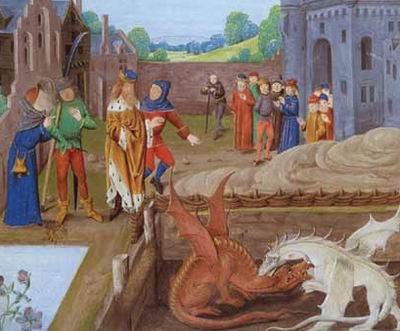 Back to Vortigern, either out of curiosity or to see if this boy really was prophetic, he orders the pond drained, and the stones moved aside. As the team of workers is moving the stone, Merlin pulls his mother back from the hole. When the stones are moved, two dragons fly from the ground, a red one, and a white one.
Back to Vortigern, either out of curiosity or to see if this boy really was prophetic, he orders the pond drained, and the stones moved aside. As the team of workers is moving the stone, Merlin pulls his mother back from the hole. When the stones are moved, two dragons fly from the ground, a red one, and a white one.
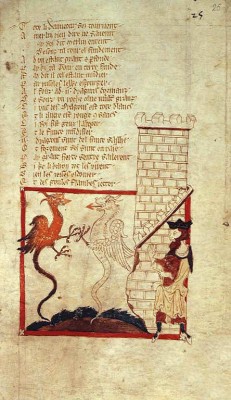 The king’s court in exile is alarmed, at first. Then, they see that the dragons are still more interested in fighting each other, not picking off a quick meal from the ground. They watch a brutally awesome dragon fight. At the end, the white dragon is killed, and then everyone realizes that hey, they might be in trouble. The red dragon is wounded, but hovers in the sky, flapping over the people. They stare at each other for a moment, before the dragon flaps and flies up, roaring one last time before disappearing into the clouds, leaving the white dragon’s corpse there. They hold their collective breaths for a minute, waiting to see if it will plummet down from the clouds for a snack, but no, it appears to be gone. As for the white dragon, well, they’re still a few years away from the story of Sigurd (episode 3D), so I guess they don’t realize that they can drink the blood and be able to talk to birds. That’s a missed opportunity.
The king’s court in exile is alarmed, at first. Then, they see that the dragons are still more interested in fighting each other, not picking off a quick meal from the ground. They watch a brutally awesome dragon fight. At the end, the white dragon is killed, and then everyone realizes that hey, they might be in trouble. The red dragon is wounded, but hovers in the sky, flapping over the people. They stare at each other for a moment, before the dragon flaps and flies up, roaring one last time before disappearing into the clouds, leaving the white dragon’s corpse there. They hold their collective breaths for a minute, waiting to see if it will plummet down from the clouds for a snack, but no, it appears to be gone. As for the white dragon, well, they’re still a few years away from the story of Sigurd (episode 3D), so I guess they don’t realize that they can drink the blood and be able to talk to birds. That’s a missed opportunity.
The Prophet
Then, Merlin launches in to a very, very very long prophecy, only marginally related to the immediate story at hand. There’s a lot written on this, and it alludes to both details that will come up in later episodes as well as the politics at the time of writing in the 12th century, but I will not be talking about the prophecy other than one key point. The white dragon represented the Saxon invaders, and the red dragon represented the native Britons. Arthur represents a boar, but that’s neither here nor there.
They stay there for some time, with Merlin and his mother being accepted into the king’s household and Vortigern consulting with the boy regularly, and ordering scribes to write down his prophecies.
Finally, Vortigern asks Merlin the question. It’s the question he’s feared since murdering two people to take the throne. The question he’s done everything with the Saxons trying to put off. He asks Merlin how he will die.
Merlin took a long sigh. He knew this was coming. He tells Vortigern that the 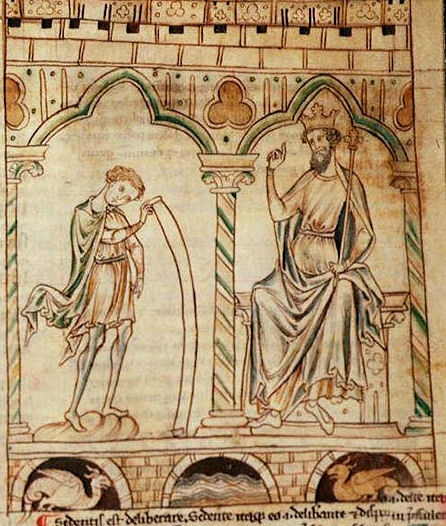 man needs to run from the fire of Ambrosius and Uther, the sons of Constantine. They’ve already set off from Brittany, and will invade the Saxon nation soon. Their goal is ultimately to expel the Saxons, but they really want to take revenge on Vortigern. They’ve spent their childhood in exile, fearing hired knives in the night or Vortigern landing an army in the daytime to finally end the rightful king’s line. They wanted to take back their kingdom, yes, but on a much more personal level, they wanted to make Vortigern hurt. Merlin tells Vortigern that he doesn’t know exactly when it will happen – how the armies will line up or when they will attack – just that it will happen. Sorry.
man needs to run from the fire of Ambrosius and Uther, the sons of Constantine. They’ve already set off from Brittany, and will invade the Saxon nation soon. Their goal is ultimately to expel the Saxons, but they really want to take revenge on Vortigern. They’ve spent their childhood in exile, fearing hired knives in the night or Vortigern landing an army in the daytime to finally end the rightful king’s line. They wanted to take back their kingdom, yes, but on a much more personal level, they wanted to make Vortigern hurt. Merlin tells Vortigern that he doesn’t know exactly when it will happen – how the armies will line up or when they will attack – just that it will happen. Sorry.
Trembling, the king orders the building of the tower halted, and they flee to a modest, yet defensible castle nearby. If you’re wondering why they didn’t just do that in the first place instead of trying to build a completely new tower with a foreign army occupying their lands, well, so am I. If there are any students of literature or history that have studied this and have an idea, please let me know. Meeting Merlin is worth it, though, and we wouldn’t have the episode with him and Vortigern had it not been for the tower.
The Vengeance of Kings
The next day, they receive word that the sons of Constantine have landed on the island, and all the Britons are rising up with their rightful kings and are attacking the Saxons in the streets. Vortigern figures he has time to prepare a defense. They wouldn’t bypass the Saxons and leave a dangerous force behind them just to punish Vortigern.
The next morning, they see a scouts riding toward the keep at full gallop. The sons of Constantine did just that. They left a reasonably-sized guard behind them to keep the Saxons at bay, but they wanted their revenge on Vortigern first. It also helped that the Saxons were now dealing with revolts all around the island, with the sons of those nobles they murdered finally having a people that would fight for them.
The Escape
It is chaos in the city where Vortigern is holed up. Some of the peasants are fleeing to the countryside, to not be caught up in this war that has nothing to do with them. Some soldiers are riding to Vortigern’s cause. The gates allow a few more carts with provisions for the inevitable siege, and no one notices two peasants slip out among the throng. One is a woman who looks like a nun from a nearby monestary, and the other looks like the serious, intelligent boy that has been seen in the company of the king. She looks back at the city as the gate closes, leaving them, once again, traveling alone through the Welsh highlands. He doesn’t look back. He can see the flames that are not yet there. The people, to him, are already dead. He’s looking forward, to an World that will be forever changed by his actions. He pulls the hood of his cloak over his head. The pair slips off into the forest, safe in the wilderness.
The Battle
That evening, the army of Aurelius and Uther arrives and surrounds the city. The watchmen on the walls can see campfires of the soldiers igniting in the night, until the darkness has been driven from the land for as far as they can see.
Aurelius is sitting up in his tent, reflecting on the last few days. They landed in the country, and after the Saxon menace had been driven from where they landed, the clergy came and anointed him king. He knew it was his duty to expel the Saxons, but he wanted nothing more than to, I quote, “sheath his sword in Vortigern’s bowels.”
It was his opinion that the Pictish assassin that murdered his father was sent by Vortigern, one that was shared by nearly everyone on the island. The earl had recommended the man for service in Constanine’s household, and had been the sole beneficiary of the assassination. To wit, we don’t ever get a confession from Vortigern, even privately, that it was him, but it was definitely him. Many authors confirm this, and it makes complete sense with everything we know of the man. Sorry to ruin the mystery.
The next day, they wheel in the siege engines, but they can’t seem to take the castle. Days pass, and they find they can’t crack the castle. They can’t bribe someone to open the gate, as was common in sieges, as the people with Vortigern were those that had chosen to stay with the exiled, extremely unpopular king, and were fiercely loyal. Besides, Vortigern didn’t have to outlast months of a siege, only they days it would require for the Saxons to overcome whatever nominal force Aurelius had left behind him. Proving once again that the enemy of his enemy can be his friend in incredibly specific and continually shifting circumstances, Vortigern just needs to sit and wait.
Aurelius knew this too, though, and unlike Vortigern, he could make difficult choices. As much as he wanted to personally end Vortigern, he needed to deal with the Saxons before they caught up to him. He ordered a warning issued to the city.
The Pyre
He said that that afternoon, if they didn’t open the gates, they would use torches, archers, and siege engines to set fire to the castle, and would not relent until it, and everyone inside, was ash. Hours passed, and the gates wouldn’t open. It was all a ruse, a trick, Vortigern thought. He wouldn’t needlessly kill hundreds of people in addition to denying his soldiers any plunder from the fort. In addition, there wouldn’t be any way to control it from spreading to the surrounding town and forest. Aurelius would be reviled.

lololol. via: http://www.vortigernstudies.org.uk/artwho/death.htm
He was wrong, and that afternoon, fires broke out all over the keep. Catapults rained down oil-soaked, flaming logs. Rank upon rank of archers shot flaming arrows. Soldiers piled fuel by the wall, and lit the piles with torches.
Aurelius’s army captured or killed anyone who ran out, but they didn’t see Vortigern. The castle burned for a full two days before the fires subsided. Vortigern had been right, too, and the Britons were unable to contain the fire before it consumed the entire town. Aurelius considered it with a heavy heart, though compared to the destruction that had passed and the destruction still to come, it would hardly be remembered.
Aurelius poked corpse after charred corpse, each nearly exactly the same as the last. The treacherous old king and his family were here, he was sure of it, but which one was known only to God.
It was small consolation. The man was dead, sure, but Aurelius didn’t get to experience it, and it provided only the scantest amount of closure. He would have to spend his time, gold, and the lives of his men undoing whatever of Vortigern’s damage as he could. Tomorrow they would ride east, and finally see the end of the Saxon occupation of Great Britain.
Next Week
Next week, Aurelius does not see the end of the Saxons in Great Britain. Nor does his successor, his brother Uther. They’re pretty much there to stay at this point. And though it’s two episodes late, next time we’ll finally meet Arthur by way of scumbag Uther’s trickery.
I want to thank Jason M Grenier, Aethrefall, Temalas, Klabautermann Fehrwight, and JarboeKamon, let me know if I said any of those right, for the reviews on iTunes, and Temalas for the longer comment on the site. If you have time, I would totally appreciate a review on itunes. If you have corrections, feedback, or thoughts for future shows, you can contact me on the site or on twitter at mythpodcast. Links to all those are in the show notes.
Also, I’ve started posting the transcript to the episode each week, with pictures, where they’re available. With the Arthurian legends, there will be a lot of pictures.
Creature of the Week
The creature this week is the Qiqirn…or Qiqion, or Keelut…and, as I seem to be saying almost constantly, I know that’s not pronounced correctly. The Q’s don’t even have u’s after them, so I’m in unknown territory. It’s from Inuit mythology.
This is a giant, bald dog that stalks the woods and terrifies people. It only has hair on its feet, ears, and the tip of its tail, and It’s also said to be outrageously stupid.
People are said to be scared of them, though I can’t figure out why. It’s a big dog, yes, but as it turns out they are as scared of humans as humans are of them. Apparently if you see it, though, you have a few moments before you start having a seizure. I’ve read that it could then eat you, but I’ve also read of it just getting scared and running off.
If you can manage to shout before you have a seizure, there is a way to scare it off – just say it’s incredibly difficult to pronounce name. As you can probably tell, I would be in big trouble. Also, there are about eight different spellings and pronunciations out there, so if they weren’t so dumb, I would think they’re flooding the internet with misinformation so people don’t know their real name.
There are stories with humans chasing them, them chasing humans, both getting each other lost in the woods, and more. All you need is a haunted house, a hallway full of doors, and some music and you have one of those Scooby Doo chase scenes where the monster is chasing the heroes, the heroes the monsters, and for some reason Don Knotts and the Harlam Globetrotters show up.
That’s the show for this week. The theme song is by the band Broke for Free, and the Creature of the Week music is by the gallant Steve Combs. Other music credits are linked in the show notes. Thanks so much listening, and I’ll see you next time.

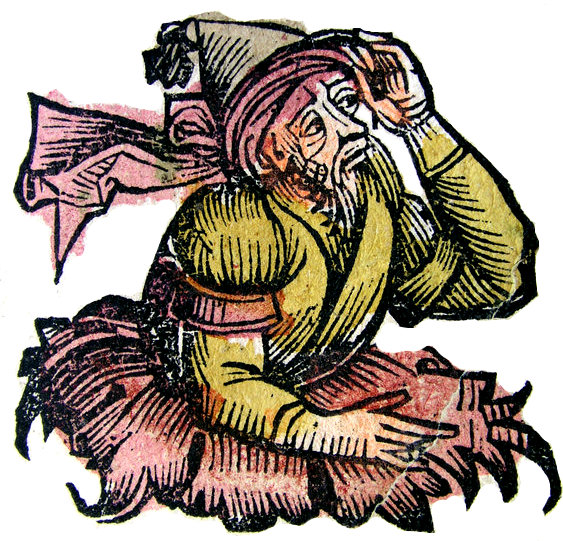

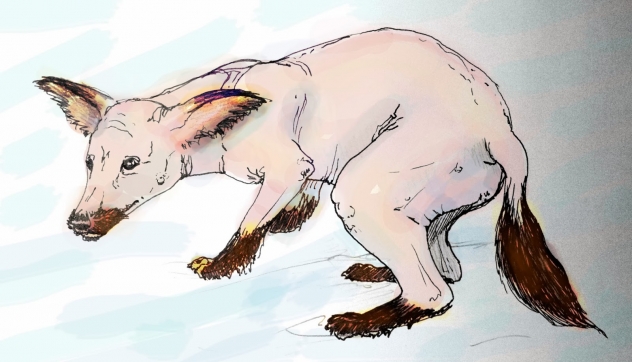
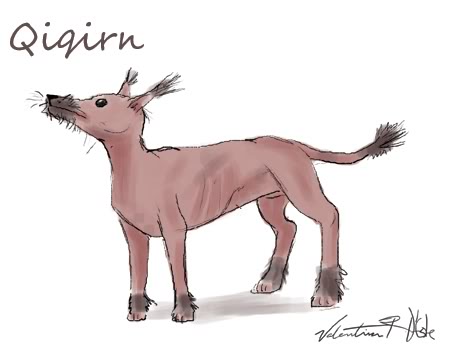
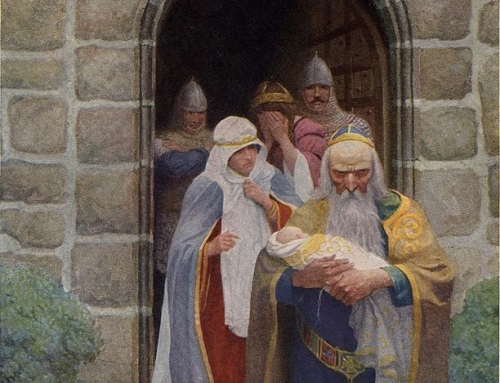

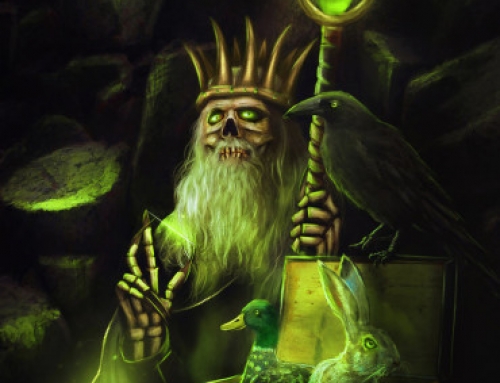
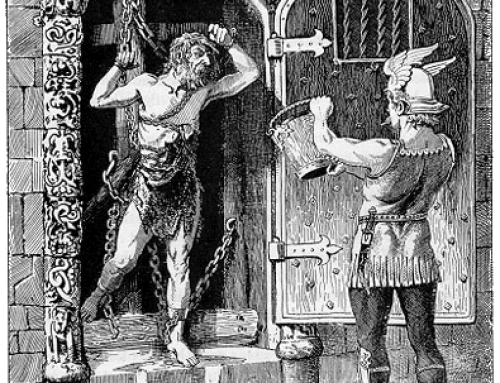

“Qiqirn” would have different pronunciations depending on the region of the arctic – but likely in Baffin Island would be pronounced something like “keekeern”, Some parts of the arctic (the Ungava coast of Nunavik, which is where I encounter the Inuit most often) would pronounce it “heeheern”.
Ur cool bro
Wax
He was a great magician. It is great to discover and read about merlin. I always wanted to explore something new in terms of knowledge which help a lot. Subscribed your blog.
What is the name of Adhan’s brother who was strangled by their mother?